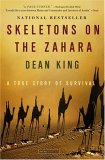Summary | Excerpt | Reading Guide | Reviews | Readalikes | Genres & Themes | Author Bio

Critics' Opinion:
Readers' Opinion:
First Published:
Jan 2004, 368 pages
Paperback:
Apr 2005, 385 pages
Prologue: 1812
In his five crossings of the Sahara, Sidi Hamet had never seen worse conditions. Forty days out of Wednoon, the sand had turned as fine as house dust and as hot as coals of fire. With their heavy loads, the camels labored up shifting dunes in spine-buckling bursts, then stumbled down the other side. With each step, the dromedaries thrust in to their knees, their wide, padded feet, designed by Allah to skim over sand, sinking like stones.
Despite his experience on the desert, Hamet had had no say in choosing this, the most direct route to Tombuctoo, about twelve-hundred miles in all, one that would take many months to travel. Having dropped south from Wednoon, then east around the Anti-Atlas Mountains in six days, the caravan of a thousand men had halted on the edge of the desert, collecting many tons of the date-size argan fruit. The men had extracted oil from the argan pits to fortify their food. They had roasted the meat of the pits, rolled it into balls, and packed these in tent-cloth sacks to serve as camel fodder and fuel for their fires. After ten days of preparations, the caravan headed southeast, navigating the trackless waste by moon, sun, and stars.
Hamet and his younger brother Seid, merchants from the north, near the city of Morocco, had only ten camels. Eight were their own and were richly loaded. The other two belonged to Hamet's father-in-law, Sheik Ali, and they carried barley. There were four thousand other camels in the caravan, many of them milk camels to feed the men en route and four hundred to bear the provisions and water. About half belonged to a powerful warlord who was a friend of the caravan's chief, Sidi Ishrel.
Like all successful caravan drivers, Ishrel was tough but just. Imposing and erect of bearing, the Arab leader had flashing eyes beneath an ample turban and a thick beard to his chest. He wore a long white haik of good cloth, befitting his status, drawn tight around his body and crisscrossed by red belts carrying his essentials: a large powder horn, flints, a leather pouch with musket balls, and his scabbard with a broad and burnished scimitar. He carried his musket night and day, always prepared for a sudden attack from the wild Bedouins of the desert. His constant nemeses, however, were the terrain and the sun.
For six days, Ishrel's caravan weltered in the deep drifts, the cameleers alternately singing to their camels and goading them with clubs, constantly dashing on foot here and there to square the loads. They gave violent shoves to bulges in woven sacks and tugged on ropes with the full weight of their bodies. For all their efforts, uneven loads were inevitable, causing strains to the camels' joints and bones. It did not take long for an inattentive master to lame a camel, and a lame camel was a dead camel, a communal feast. In that way, Allah provided for them all. It was his will, and there was no compensation for the camel's owner in this world. "We only feed you for Allah's sake," says the Quran. "We desire from you neither reward nor thanks."
On the seventh day, the irifi, 'the wind of the desert', roared in from the southeast, and the sand swirled. Sidi Ishrel ordered the camels to be unloaded and camp made. In a hurry, the Arabs stacked their goods - iron, lumber, amber, shotguns, knives, scimitars, bundles of haiks, white cloth and blue cloth, blocks of salt, sacks of tobacco and spices - in a great pile. They circled up the camels and made them lie down.
All around them the sand blew so hard that the men could not open their eyes, and if they did, they could not see their companions or their camels even if they were nearly touching them. It was all they could do to breathe. Lying on their stomachs, Hamet and Seid inhaled through the sheshes wrapped around their heads and across their faces, which they pressed into the sand.
Copyright © 2004 by Dean H. King. All rights reserved.




Discovery consists of seeing what everybody has seen and thinking what nobody has thought.
Click Here to find out who said this, as well as discovering other famous literary quotes!
Your guide toexceptional books
BookBrowse seeks out and recommends the best in contemporary fiction and nonfiction—books that not only engage and entertain but also deepen our understanding of ourselves and the world around us.